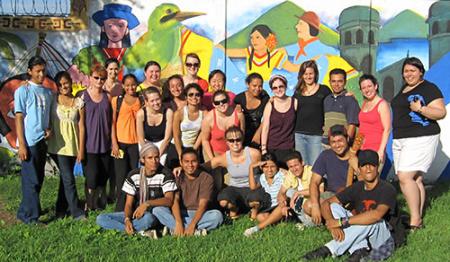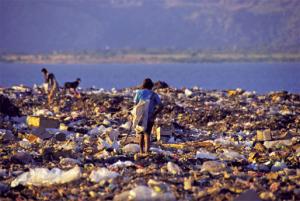Sisterhood and Solidarity
A transformative learning experience abroad inspires a group of students to make changes in their own lives.

 In June, 12 students from TCNJ’s Women in Learning and Leadership (WILL) Program traveled to Nicaragua as the culmination of a two-semester engaged learning experience. The Nicaragua Solidarity Project, as the experience was called, gave the students insight into the lives of people who have been socially, economically, and politically marginalized, explained Mary Lynn Hopps, director of the WILL program. The women learned about macro-level social, economic, political, and religious issues from various perspectives, while witnessing firsthand the struggles and successes of people profoundly impacted by war and social policies.
In June, 12 students from TCNJ’s Women in Learning and Leadership (WILL) Program traveled to Nicaragua as the culmination of a two-semester engaged learning experience. The Nicaragua Solidarity Project, as the experience was called, gave the students insight into the lives of people who have been socially, economically, and politically marginalized, explained Mary Lynn Hopps, director of the WILL program. The women learned about macro-level social, economic, political, and religious issues from various perspectives, while witnessing firsthand the struggles and successes of people profoundly impacted by war and social policies.
Read journal excerpts from trip participant Maria Avilez ’10.
“The idea behind this trip was to foster understanding,” Hopps said. “We were there to listen to the people,” not to do charity work. “This was an entirely different idea than, say, going somewhere to help build a hospital, or a church.”
“In order to truly understand, you have to walk with the people,” Hopps explained.
Read journal excerpts from trip participant Natalie Serra ’10.
This theme of solidarity was ingrained in the students from the start. Rather than simply paying for their trips out of pocket, each student spent two semesters raising money to cover their costs. “The students [needed to] understand that we come from a very privileged place, and we were going to a place where people are not very privileged,” Hopps explained. “Those people can’t just write a check and get on an airplane,” Hopps said, so it was essential that the students not be allowed to do so either.
Read journal excerpts from trip participant Katrina Blaise ’11.
Once in Nicaragua, the students spent time studying and dialoguing with locals on such issues as women’s rights, globalization and trade, post-war transition, the effects of religion on the population, immigration, and the impact of U.S. foreign policy on Latin America. The group traveled to youth centers, held candid discussions with economists and gender experts, and visited schools and women’s cooperatives.
Read journal excerpts from trip participant Debra H. Cho ’10.

Perhaps the most haunting event of the trip, members said, was the visit to La Chureca, the Managua City Dump. Katie Tedesco ’11, a women’s and gender studies major and WILL member, explained that 900 people live inside the 160-acre dump. The people were displaced years ago by a hurricane, and when the government had no place to put them, they rebuilt their lives inside the wasteland. Men, women, and children spend their days sifting through garbage, animal remains, and medical waste in search of anything they can find to sell to survive.
Read journal excerpts from trip participant Katie Tedesco ’11.
“What astounded us all was that there was an entire economy within the dump,” said Carolin Guentert ’11, an international studies major/women’s and gender studies minor. “There are children who are born there that never leave those 160 acres.”
Read journal excerpts from trip participant Carolin Guentert ’11.
“It was unlike anything I had ever seen,” added Tedesco. “I don’t know that I would ever want people to see the pictures I have in my mind.”
Now, having returned from the trip and had time to reflect on what they saw and learned, the women are committed to sharing their experiences with campus. “I think the most important thing we can bring from this is knowledge—seeing what we’ve experienced, we see how we can change our lives in little ways to eventually make a difference,” said Guentert. In November, the group will make a presentation to campus about the trip.
Read journal excerpts from trip participant Janine Bernardo ’10.
“I think the trip affected each of us differently,” Guentert continued. “But I think for all of us, the transformative experience that we all had is most important. That’s where it all starts. Once you know about situations, once you’re no longer ignorant about what’s going on in certain places, it’s easier to put those things into practice in different areas of your life.”
Posted on November 9, 2009


